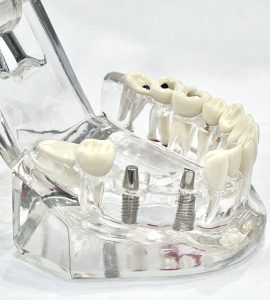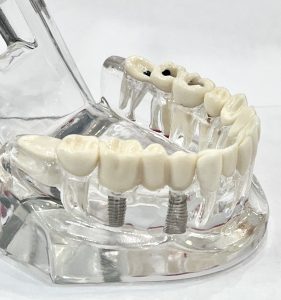Dr. Song's dental clinic has a specialized implant surgery room, using the renowned Hiossen implants from the USA. Our clinic is also among the first to implement the world's most advanced low-radiation PLANMECA CBCT, which is an imaging technology that helps dentists to precisely determine implant surgery plans, improving the success rate of implants and reducing surgical complications. Dr. Song has over ten years of experience in implant surgery, successfully completing thousands of implants. As a senior member of the International Congress of Oral Implantologists, Dr. Song actively participates in various international academic exchanges as well.
Common Questions About Dental Implants:
What are the risks of not replacing missing teeth for a long time?
The opposing teeth may over-erupt, and adjacent teeth may tilt, disrupting the occlusion of your teeth, making it more difficult to replace the missing teeth later.
The jawbone will continually shrink, complicating future dental restoration plans and affecting the results.
Reduced chewing function impacts the ability to grind and crush food, increasing the burden on the stomach. Impacts on digestive functions may eventually affect overall health.
Facial collapse in the area of missing teeth can lead to a sunken appearance and asymmetry, with one side of the face appearing larger than the other.
Multiple missing teeth can affect speech and aesthetics.
Who can get dental implants?
No matter your age, or the cause of tooth loss, dental implants can be suitable for anyone with missing teeth, especially those who cannot wear dentures due to a flat jawbone or gag reflex. If you are considering implants, you must consult a dentist for a precise evaluation to determine if you are a suitable candidate and how to proceed.
Advantages of dental implants:
Due to the various advantages of dental implants, many people choose to get it even though it may appear to be more costly than other procedures.
No need to remove and clean daily, unlike dentures. It is often an inconvenience for people to remove and clean dentures every day, and it is also easy to lose. Implants, on the other hand, are secured just like your own teeth and only need you to rinse your mouth and brush your teeth after eating.
Does not affect adjacent teeth. People who have dentures would know that whether it’s a removable denture or a fixed bridge, adjacent teeth need to be grounded a bit. However, dental implants do not require altering the neighboring teeth. People who have removable dentures also often report that the dentures can damage adjacent teeth over time because they rely on neighboring teeth for support under the pressures of chewing. Dental implants, on the other hand, do not negatively affect adjacent teeth and can even help to protect them. Those who have fixed bridges know that bridges often develop problems after a few years and may need to be removed, only to find that the adjacent supporting teeth have deteriorated or become unusable. In contrast, if an issue arises with a dental implant, only the implant site needs to be addressed without affecting the neighboring teeth.
Better chewing function, enhancing digestion and overall health. Removable dentures can only restore very limited functions, while implants are almost as good as natural teeth. When more than a couple teeth are lost, removable dentures often have larger plastic or metal bases which makes eating food less enjoyable. In contrast, dental implants do not have a base.
More natural appearance, boosting confidence. Because implants look like your natural teeth and are more aesthetic, you don’t have to worry about other people noticing you have false teeth or false teeth falling out while you speak or eat.
Improved speech with minimal foreign body sensation.
When is the best time for dental implants?
After you lose your teeth, your gums start shrinking. The longer you wait, the more it shrinks. Severely shrinked gums can make future implant procedures more complicated. So if you are considering implants, you should follow these principles:
- If a tooth needs to be extracted due to severe decay, periodontal disease, or residual roots
It is best to consult with a dentist before extraction because in some cases, the implant can be placed on the same day as the extraction. Sometimes special treatment of the extraction socket is required, which can greatly simplify the future implant procedures.
- If a tooth is lost due to trauma
You should see a dentist as soon as possible because some cases may allow for immediate implantation after teeth loss.
- If the tooth has been missing for many years
You should consult with a dentist to determine if you are still a viable candidate for implants. The dentist will also see if you need a bone graft before implantation to compensate for your bone shrinking.
Risks of dental implants:
- Implant failure
The success rate of implants is high. However, due to various factors, inflammation may affect the recovery from implant surgery causing the implant to loosen or fall out. The probability of this happening is usually controlled at less than 5% of cases. If this happens, there will not be severe pain or discomfort, but removal and reimplantation may be necessary.
- Complications of implantation
Complications such as sinus perforation, nerve damage, injury to adjacent teeth, or bleeding can be minimized with proper preparation and experienced surgeons.
- Other problems
Issues like porcelain chipping or screw loosening can occur but can generally be resolved.
Success rate and lifespan of dental implants:
Success rates range from 90% to 95% and above. If there are no problems during the year after implantation, it is less likely for problems to arise later. The first Swedish patient to receive titanium dental implants, Gosta Larsson, used his implants for 40 years, and they remained in good condition until his death. Some common factors affecting the success and lifespan of the implants include:
- The condition of the jawbone, including the height, width, and density of the alveolar bone
- The skill level of the dental implant team
- Oral hygiene
- The health of the remaining teeth in the mouth, particularly if periodontal disease is well controlled
- Smoking habits
- Habits such as clenching or grinding teeth at night
Importance of a collaborative implant team:
Dental implants require high technical proficiency and close cooperation among dental implant surgeons, prosthodontists, and periodontists. After a patient expresses the desire for dental implants, the implant surgeon (either an oral surgeon or periodontist) conducts a clinical examination, takes X-rays, and performs a CT scan to assess the jawbone's condition. This evaluation determines if the bone volume is sufficient or if bone grafting is necessary. The implant surgeon and prosthodontist collaboratively decide on the number, position, and angle of the implants. The implant is then placed into the jawbone according to the prosthodontic requirements, and once stabilized, the prosthodontist completes the upper prosthetic restoration. Before any implant surgery, the periodontist must thoroughly address any periodontal issues with the remaining teeth. After the dental implants are placed, patients must regularly visit the implant surgeon or periodontist for ongoing maintenance to ensure the longevity and success of the implants. Regular check-ups and proper oral hygiene are essential to prevent implant failure.
Maintenance for dental implants:
Maintain implants like your natural teeth with daily brushing, flossing, and regular dental check-ups and cleanings.
Would my body reject the dental implant?
The material used for implants is titanium, which is biocompatible with your gums and bones therefore unlikely to cause rejection. Titanium implants are also widely used in other medical fields such as prosthetics, artificial ears, eyes, and joints.


